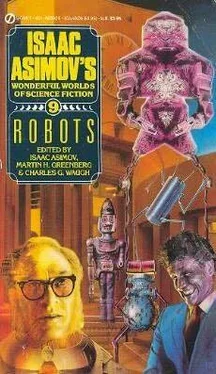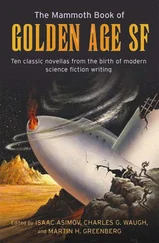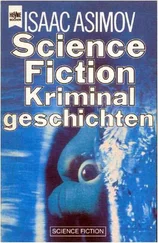Frederik Pohl - Isaac Asimov's Worlds of Science Fiction. Book 9 - Robots
Здесь есть возможность читать онлайн «Frederik Pohl - Isaac Asimov's Worlds of Science Fiction. Book 9 - Robots» весь текст электронной книги совершенно бесплатно (целиком полную версию без сокращений). В некоторых случаях можно слушать аудио, скачать через торрент в формате fb2 и присутствует краткое содержание. Год выпуска: 1989, ISBN: 1989, Издательство: Robinson Publishing, Жанр: Фантастика и фэнтези, на английском языке. Описание произведения, (предисловие) а так же отзывы посетителей доступны на портале библиотеки ЛибКат.
- Название:Isaac Asimov's Worlds of Science Fiction. Book 9: Robots
- Автор:
- Издательство:Robinson Publishing
- Жанр:
- Год:1989
- ISBN:ISBN: 1-85487-041-6
- Рейтинг книги:4 / 5. Голосов: 1
-
Избранное:Добавить в избранное
- Отзывы:
-
Ваша оценка:
- 80
- 1
- 2
- 3
- 4
- 5
Isaac Asimov's Worlds of Science Fiction. Book 9: Robots: краткое содержание, описание и аннотация
Предлагаем к чтению аннотацию, описание, краткое содержание или предисловие (зависит от того, что написал сам автор книги «Isaac Asimov's Worlds of Science Fiction. Book 9: Robots»). Если вы не нашли необходимую информацию о книге — напишите в комментариях, мы постараемся отыскать её.
Isaac Asimov's Worlds of Science Fiction. Book 9: Robots — читать онлайн бесплатно полную книгу (весь текст) целиком
Ниже представлен текст книги, разбитый по страницам. Система сохранения места последней прочитанной страницы, позволяет с удобством читать онлайн бесплатно книгу «Isaac Asimov's Worlds of Science Fiction. Book 9: Robots», без необходимости каждый раз заново искать на чём Вы остановились. Поставьте закладку, и сможете в любой момент перейти на страницу, на которой закончили чтение.
Интервал:
Закладка:
"Thank you, sir," said Cliff-and calmly asked more: "And will you be so kind as to authorize me to be present outside the building tonight? Just outside. I've a feeling something's going to happen."
"You want still another scoop, I see," said Sanders not unkindly, "then you'll let the police wait while you transact your business."
"Not again, sir. If anything happens, they'll get it at once."
The chief hesitated. "I don't know," he said. "I'll tell you what. All the news services will want men there, and we can't have that; but if you can arrange to represent them all yourself, it's a go. Nothing's going to happen, but your reports will help calm the hysterical ones. Let me know."
Cliff thanked him and hurried out and phoned his syndicate the tip-free-then told them Sanders' proposal. Ten minutes later they called him back, said all was arranged, and told him to catch some sleep. They would cover the pouring. With light heart, Cliff hurried over to the museum. The place was surrounded by thousands of the curious, held far back by a strong cordon of police. For once he could not get through; he was recognized, and the police were still sore. But he did not care much; he suddenly felt very tired and needed that nap. He went back to his hotel, left a call, and went to bed.
He had been asleep only a few minutes when his phone rang. Eyes shut, he answered it. It was one of the boys at the syndicate, with peculiar news. Stillwell had just reported, very much alive-the real Stillwell. The two dead ones were some kind of copies; he couldn't imagine how to explain them. He had no brothers.
For a moment Cliff came fully awake, then he went back to bed. Nothing was fantastic anymore.
6
At four o'clock, much refreshed and with an infrared viewing magnifier slung over his shoulder, Cliff passed through the cordon and entered the door of the wing. He had been expected and there was no trouble. As his eyes fell on Gnut, an odd feeling went through him, and for some obscure reason he was almost sorry for the giant robot.
Gnut stood exactly as he had always stood, the right foot advanced a little, and the same brooding expression on his face; but now there was something more. He was solidly encased in a huge block of transparent glasstex. From the floor on which he stood to the top of his full eight feet, and from there on up for an equal distance, and for about eight feet to the left, right, back, and front, he was immured in a water-clear prison which confined every inch of his surface and would prevent the slightest twitch of even his amazing muscles.
It was absurd, no doubt, to feel sorry for a robot, a manmade mechanism, but Cliff had come to think of him as being really alive, as a human is alive. He showed purpose and will; he performed complicated and resourceful acts; his face had twice clearly shown the emotion of sadness, and several times what appeared to be deep thought; he had been ruthless with the gorilla, and gentle with the mockingbird and the other two bodies, and he had twice refrained from crushing Cliff when there seemed every reason that he might. Cliff did not doubt for a minute that he was still alive, whatever "alive" might mean.
But outside were waiting the radio and television men; he had work to do. He turned and went to them and all got busy.
An hour later Cliff sat alone about fifteen feet above the ground in a big tree which, located just across the walk from the building, commanded through a window a clear view of the upper part of Gnut's body. Strapped to the limbs about him were three instruments-his infrared viewing magnifier, a radio mike, and an infrared television eye with sound pickup. The first, the viewing magnifier, would allow him to see in the dark with his own eyes, as if by daylight, a magnified image of the robot, and the others would pick up any sights and sounds, including his own remarks, and transmit them to the several broadcast studios which would fling them millions of miles in all directions through space. Never before had a picture man had such an important assignment, probably-certainly not one who forgot to take pictures. But now that was forgotten, and Cliff was quite proud, and ready.
Far back in a great circle stood a multitude of the curious-and the fearful. Would the plastic glasstex hold Gnut? If it did not, would he come out thirsting for revenge? Would unimaginable beings come out of the traveler and release him, and perhaps exact revenge? Millions at their receivers were jittery; those in the distance hoped nothing awful would happen, yet they hoped something would, and they were prepared to run.
In carefully selected spots not far from Cliff on all sides were mobile ray batteries manned by army units, and in a hollow in back of him, well to his right, there was stationed a huge tank with a large gun. Every weapon was trained on the door of the wing. A row of smaller, faster tanks stood ready fifty yards directly north. Their ray projectors were aimed at the door, but not their guns. The grounds about the building contained only one spot-the hollow where the great tank was-where, by close calculation, a shell directed at the doorway would not cause damage and loss of life to some part of the sprawling capital.
Dusk fell; out streamed the last of the army officers, politicians, and other privileged ones; the great metal doors of the wing clanged to and were locked for the night. Soon Cliff was alone, except for the watchers at their weapons scattered around him.
Hours passed. The moon came out. From time to time Cliff reported to the studio crew that all was quiet. His unaided eyes could now see nothing of Gnut but the two faint red points of his eyes, but through the magnifier he stood out as clearly as if in daylight from an apparent distance of only ten feet. Except for his eyes, there was no evidence that he was anything but dead and unfunctionable metal.
Another hour passed. Now and again Cliff thumbed the levels of his tiny radio-television watch-only a few seconds at a time because of its limited battery. The air was full of Gnut and his own face and his own name, and once the tiny screen showed the tree in which he was then sitting and even, minutely, himself. Powerful infrared long-distance television pickups were even then focused on him from nearby points of vantage. It gave him a funny feeling.
Then, suddenly, Cliff saw something and quickly bent his eye to the viewing magnifier. Gnut's eyes were moving; at least the intensity of the light emanating from them varied. It was as if two tiny red flashlights were turned from side to side, their beams at each motion crossing Cliffs eyes.
Thrilling, Cliff signaled the studios, cut in his pickups, and described the phenomenon. Millions resonated to the excitement in his voice. Could Gnut conceivably break out of that terrible prison?
Minutes passed, the eye flashes continued, but Cliff could discern no movement or attempted movement of the robot's body. In brief snatches he described what he saw. Gnut was clearly alive; there could be no doubt he was straining against the transparent prison in which he had at last been locked fast; but unless he could crack it, no motion should show.
Cliff took his eyes from the magnifier-and started. His unaided eye, looking at Gnut shrouded in darkness, saw an astonishing thing not yet visible through his instrument. A faint red glow was spreading over the robot's body. With trembling fingers he readjusted the lens of the television eye, but even as he did so the glow grew in intensity. It looked as if Gnut's body were being heated to incandescence!
He described it in excited fragments, for it took most of his attention to keep correcting the lens. Gnut passed from a figure of dull red to one brighter and brighter, clearly glowing now even through the magnifier. And then he moved! Unmistakably he moved!
Читать дальшеИнтервал:
Закладка:
Похожие книги на «Isaac Asimov's Worlds of Science Fiction. Book 9: Robots»
Представляем Вашему вниманию похожие книги на «Isaac Asimov's Worlds of Science Fiction. Book 9: Robots» списком для выбора. Мы отобрали схожую по названию и смыслу литературу в надежде предоставить читателям больше вариантов отыскать новые, интересные, ещё непрочитанные произведения.
Обсуждение, отзывы о книге «Isaac Asimov's Worlds of Science Fiction. Book 9: Robots» и просто собственные мнения читателей. Оставьте ваши комментарии, напишите, что Вы думаете о произведении, его смысле или главных героях. Укажите что конкретно понравилось, а что нет, и почему Вы так считаете.









